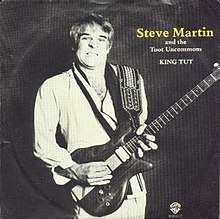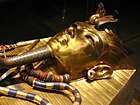King Tut (song)
"King Tut" is a novelty song performed by Steve Martin and the Toot Uncommons (actually members of the Nitty Gritty Dirt Band).
| "King Tut" | ||||
|---|---|---|---|---|
 | ||||
| Single by Steve Martin and the Toot Uncommons | ||||
| from the album A Wild and Crazy Guy | ||||
| B-side |
| |||
| Released | April 28, 1978 | |||
| Format | 7" vinyl record | |||
| Genre | Novelty, R&B, funk | |||
| Length | 2:10 | |||
| Label | Warner Bros. | |||
| Songwriter(s) | Steve Martin | |||
| Producer(s) | William E. McEuen | |||
| Steve Martin singles chronology | ||||
| ||||
History and description
The song was released as a single in 1978, sold over a million copies,[1] and reached number 17 on the Billboard Hot 100 chart.[2] Martin previewed the song in a live performance during the April 22, 1978 episode of Saturday Night Live. The song was also included on Martin's album A Wild and Crazy Guy.
"King Tut" paid homage to Egyptian pharaoh Tutankhamun and presents a caricature of the Treasures of Tutankhamun traveling exhibit that toured seven United States cities from 1976 to 1979. The exhibit attracted approximately eight million visitors.
In the Saturday Night Live performance of "King Tut," loyal subjects appease a joyful King Tut with kitchen appliances. An instrumental solo is delivered by saxophone player Lou Marini, who steps out of a sarcophagus—painted gold—to great laughter.
In the book Saturday Night: A Backstage History of Saturday Night Live, authors Doug Hill and Jeff Weingrad write that the sketch was one of the most expensive productions the show had attempted up to that point. Martin had brought the song to the show and asked if he could perform it, not expecting the production that occurred—producer Lorne Michaels put everything behind it. Martin and the Steep Canyon Rangers later recorded the song in a bluegrass version for their 2011 album, Rare Bird Alert.
The song is the subject of an analysis in Melani McAlister's 2001 book, Epic Encounters: Culture, Media, and U.S. Interests in the Middle East Since 1945.[3] It is also referenced in a dialogue in the video game The Lost Vikings (1992) at the end of one of the Egyptian themed levels of the game.[4]
Chicago radio superstation WLS-AM, which gave the song much airplay, ranked "King Tut" as the 11th biggest hit of 1978.[5] It spent four weeks at the number-one position on their chart during the time the Tut exhibition was on display at the Field Museum of Natural History in downtown Chicago.
In 2017, students in a humanities class at Reed College in Portland, Oregon, protested the inclusion of the Saturday Night Live performance in their coursework, calling it an example of cultural appropriation while demanding its removal. One complained that the gold face of the saxophone player was a racist exhibition of blackface.[6]
Chart performance
References
- "Sensational Steve Martin". Time. August 24, 1987. Archived from the original on December 21, 2010. Retrieved September 19, 2010.
- "Top 10 Weirdest Actors Turned Singers". Time. July 27, 2010. Archived from the original on October 6, 2010. Retrieved September 19, 2010.
- McAlister, Melani (2001). "3". King Tut, Commodity, Nationalism, and the Politics of Oil, 1973–1979. Epic Encounters: Culture, Media, and U.S. Interests in the Middle East Since 1945. Berkeley and Los Angeles, California: University of California Press. p. 125. ISBN 9780520244993. LCCN 2004059882. OCLC 49851842. Retrieved January 17, 2020 – via Google Books.
- "The Lost Vikings (Genesis) - Part 5 (Egypt, QCKS, PHR0, C1R0, SPKS)". YouTube. July 8, 2010. Archived from the original on April 30, 2016. Retrieved July 27, 2011.
- "WLS Musicradio Big 89 of 1978". Oldiesloon.com. Archived from the original on August 21, 2016. Retrieved August 27, 2016.
- Steinbuch, Yaron (November 21, 2017). "Students blast Steve Martin's King Tut skit as racist". News. New York City: New York Post. Archived from the original on May 15, 2018. Retrieved January 17, 2020.
- "Top Singles - Volume 29, No. 22, August 26 1978". RPM. Collectionscanada.gc.ca. Archived from the original on March 12, 2016. Retrieved August 27, 2016.
- Joel Whitburn's Top Pop Singles 1955-1990 - ISBN 0-89820-089-X
- Cash Box Top 100 Singles, August 12, 1979
- "Top Singles - Volume 30, No. 14, December 30 1978". RPM. Collectionscanada.gc.ca. Archived from the original on March 12, 2016. Retrieved August 27, 2016.
- Whitburn, Joel (1999). Pop Annual. Menomonee Falls, Wisconsin: Record Research Inc. ISBN 0-89820-142-X.
External links
- Lyrics of this song at MetroLyrics
- Live performance of "King Tut" by Steve Martin on YouTube (3:33 minutes). Official Saturday Night Live channel, not available in all countries.
